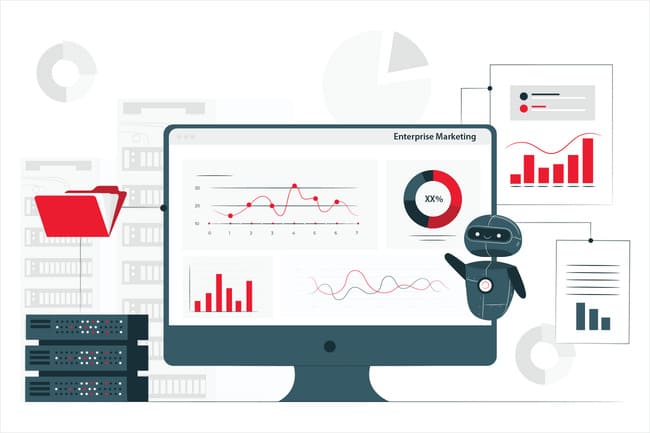The global enterprise software market is a rapidly growing market that offers various software solutions to businesses to improve their operational efficiency, productivity, and decision-making. According to a report by Grand View Research, the global enterprise software market size is expected to reach $ 450.68 billion by 2030.
One of the major drivers of this market growth is the increasing demand for automation and the need for effective management of business operations across different departments. Additionally, the rising adoption of cloud-based software solutions is also fueling the growth of this market.
The report also highlights the increasing use of artificial intelligence (AI), machine learning, and Internet of Things (IoT) technologies in enterprise software. Moreover, the report suggests that the Asia Pacific region is expected to witness significant growth in the enterprise software market due to increasing digitization and technological advancements in countries such as China and India.
The report also identifies some of the key players in the global enterprise software market, including Microsoft, Oracle, SAP, IBM, Salesforce.com, and Adobe Systems, among others. These players are investing heavily in research and development to offer more advanced software solutions to their clients and gain a competitive edge in the market.
What Is Enterprise Marketing?
Enterprise software refers to the applications and tools used by businesses to manage their operations, while enterprise software marketing refers to the marketing efforts of software companies that sell to enterprise customers. Therefore, enterprise software marketing can be both global and local, depending on the reach and target audience of the software company.
The marketing strategies employed by enterprise software companies are often geared towards showcasing their products’ features, benefits, and unique selling propositions to potential customers. These marketing strategies can include advertising, content marketing, influencer marketing, email marketing, and events such as conferences and trade shows. Ultimately, the goal of enterprise software marketing is to drive sales, increase revenue, and establish the software company as a leader in the enterprise software market.
Enterprise Marketing Trends
Enterprise marketing trends refer to the evolving strategies and practices that businesses use to reach their target audience and achieve their marketing objectives in the enterprise software market. Reaching out to a digital marketing agency will help a great deal in this situation.
Here are some of the current trends in enterprise marketing:
- Account-Based Marketing (ABM): This approach targets specific accounts or companies rather than a broad audience. ABM involves identifying high-value accounts and customizing marketing efforts to address their unique needs.
- Personalization: Personalization involves tailoring marketing efforts to individual customers, using data and insights to create targeted messaging and content.
- Video Marketing: Video is becoming an increasingly popular way to engage with audiences and share information. Video marketing can include product demos, how-to videos, customer testimonials, and more.
- Influencer Marketing: Influencer marketing involves partnering with industry experts or thought leaders to promote your products or services. This approach can help build credibility and expand your reach within the enterprise software market.
- Account-Based Advertising (ABA): Similar to ABM, ABA targets specific accounts or companies through digital advertising channels. This approach involves creating custom ad campaigns that are targeted to specific accounts or decision-makers within those accounts.
- Content Marketing: Content marketing involves creating valuable, informative content that attracts and engages potential customers. This approach can include blog posts, whitepapers, webinars, and other forms of content that showcase your expertise and thought leadership within the enterprise software market.
- Social Media Marketing: Social media can be a powerful way to connect with potential customers and build brand awareness in the enterprise software market. This approach can include creating and sharing content on social media platforms, as well as using paid social media advertising to reach specific audiences.
How To Create an Enterprise Marketing Strategy
Creating an effective enterprise marketing strategy requires a deep understanding of the company’s goals, target audience, and competitive landscape.
Here are some steps to create an enterprise marketing strategy:
- Identify target audience: Identify the target audience for the enterprise software, including their demographics, behavior, and pain points.
- Define goals: Define the goals of the enterprise software marketing strategy, including lead generation, revenue growth, and customer acquisition.
- Conduct competitive analysis: Analyze the competitive landscape to understand the strengths, weaknesses, opportunities, and threats of competitors.
- Develop messaging and positioning: Develop messaging and positioning that differentiates the enterprise software from competitors and resonates with the target audience.
- Determine channels: Determine the most effective marketing channels to reach the target audience, such as search engine marketing, social media advertising, and content marketing.
- Set a budget: Set a budget for the enterprise software marketing strategy, considering the cost of various marketing channels and tactics.
- Measure results: Measure the success of the enterprise software marketing strategy by tracking metrics such as leads generated, revenue growth, and customer acquisition.
By following these steps, companies can create an effective enterprise marketing strategy that drives growth and revenue.
Tips For Using Enterprise Marketing
Here are some basic tips for using enterprise marketing:
- Focus on customer experience: Enterprise marketing should revolve around creating a great customer experience, as this is crucial for attracting and retaining customers. This involves understanding the needs and preferences of your target audience and creating marketing strategies that resonate with them.
- Leverage data and analytics:Data and analytics are essential for enterprise marketing success. By collecting and analyzing customer data, you can gain insights into their behavior, preferences, and pain points. This information can be used to create more targeted and effective marketing campaigns.
- Invest in content marketing: Content marketing is a great way to establish your brand as a thought leader and provide value to your customers. By creating high-quality content, such as blog posts, whitepapers, and videos, you can educate and inform your target audience, build trust, and generate leads.
- Use marketing automation: Marketing automation can streamline your marketing efforts and help you reach more customers. By automating tasks such as email marketing, social media posting, and lead nurturing, you can save time and resources while delivering a consistent message to your target audience.
- Align sales and marketing: Enterprise marketing should be closely aligned with sales, as both functions work towards the same goal of generating revenue. By collaborating with sales teams and sharing insights and data, marketers can create more effective campaigns that target the right audience and drive results.
- Experiment and innovate: Enterprise marketing requires a willingness to experiment and innovate. This means trying new channels, tactics, and strategies to see what works best for your business. By staying on top of trends and being open to new ideas, you can stay ahead of the competition and drive growth for your enterprise.
Enterprise Marketing Examples
Enterprise marketing examples can vary widely depending on the industry, target audience, and marketing goals of the enterprise.
Here are a few examples of successful enterprise marketing campaigns:
- Salesforce: The software company uses a variety of marketing strategies to reach their enterprise audience, including targeted email campaigns, social media advertising, and events. They also use thought leadership content, such as blog posts and whitepapers, to establish themselves as industry leaders and build trust with potential customers.
- Microsoft: The technology giant uses account-based marketing (ABM) to target specific accounts and decision-makers within those accounts. They also use a variety of content marketing tactics, including blog posts, videos, and webinars, to educate and engage their audience.
- IBM: The multinational technology company uses a combination of digital marketing and events to reach their enterprise audience. They also leverage influencer marketing by partnering with industry experts to create content and promote their products.
- Oracle: The enterprise software company uses a variety of marketing tactics, including targeted advertising, events, and content marketing. They also leverage customer success stories and case studies to demonstrate the value of their products and services.
- SAP: The software company uses a combination of digital marketing, events, and content marketing to reach their enterprise audience. They also prioritize customer experience, using personalization and data-driven insights to improve the customer journey.
Conclusion
Enterprise marketing is an essential aspect of any business, whether big or small. The success of an enterprise marketing strategy depends on understanding the target audience and creating a unique marketing plan tailored to their needs. Trends in enterprise marketing such as artificial intelligence, personalization, and automation continue to shape the industry, and businesses need to keep up with these changes to stay relevant.
A solid enterprise marketing strategy involves a deep understanding of the customer journey, data analysis, and a commitment to continuous improvement. By implementing the right tools and techniques, businesses can effectively engage with their customers, build strong relationships, and drive long-term growth.





Tell us your thoughts in the comments